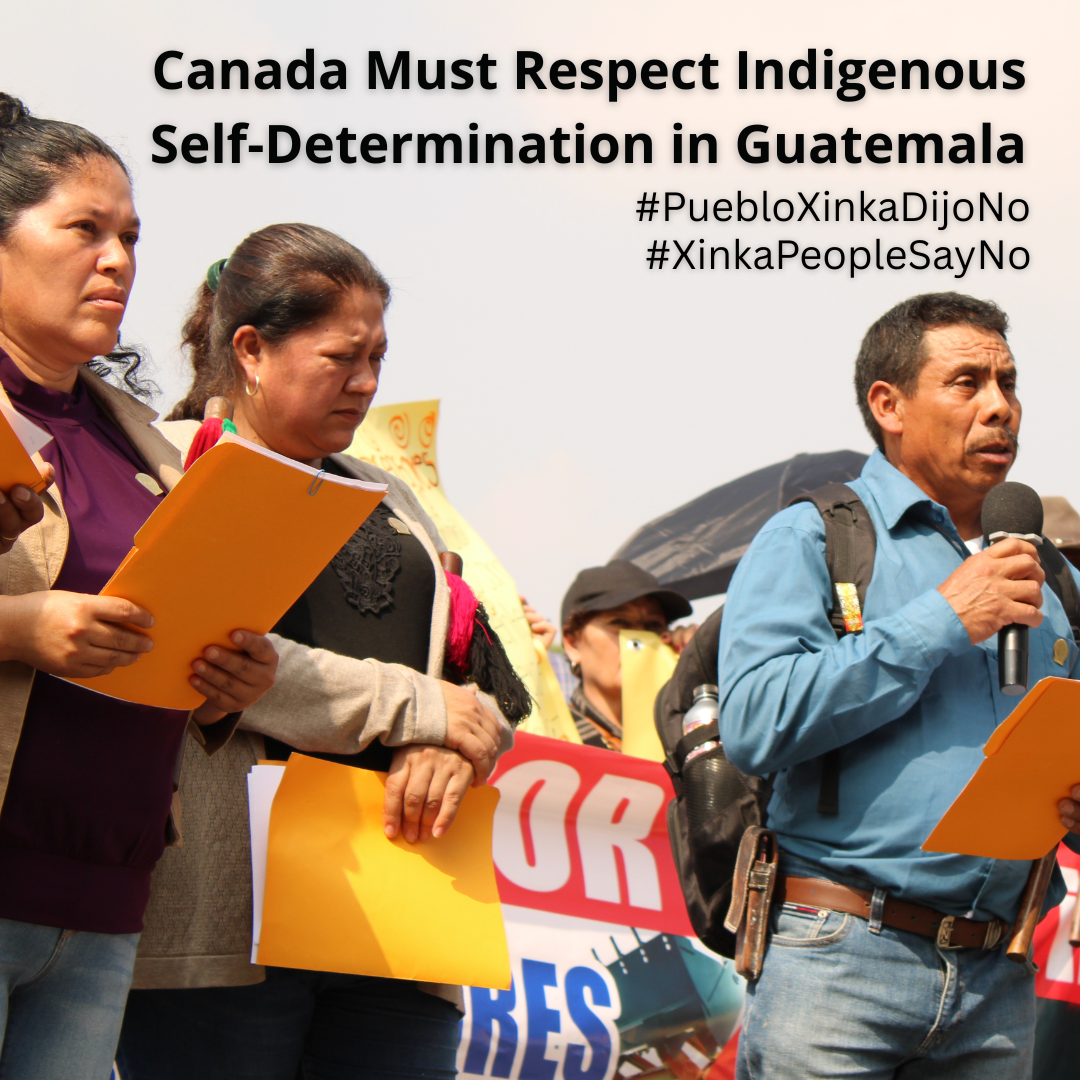A Delegation of Xinka Women will visit Eastern Canada in September 2025 #PuebloXinkaDijoNo
After nearly seven years in a court-ordered consultation process, the Xinka Indigenous People of Guatemala have denied consent for the restart of Canadian Pan American Silver’s Escobal mine in southern Guatemala. The Xinka are now calling for its permanent closure. The company and Canadian authorities must respect their decision in accord with their rights to self-determination.
From September 11-23, 2025, two Xinka women leaders, Marisol Guerra and Marta Muñoz, will visit the Maritimes, Toronto and Ottawa to raise awareness about their struggle for self-determination and the health of their communities. They will speak to their concerns about the silver mine, threats and attacks against the Xinka People, the challenges they have faced during the consultation process, and their hopes for the future.
The risks of mining without the consent of the Xinka People are already clear based on the early years of the Escobal project.
The Escobal mine, originally owned by Tahoe Resources, was forced into production in early 2014 using violent repression by private security, police and military, as well as a campaign to defame and criminalize community leaders. Several members of the resistance, including 16-year-old Topacio Reynoso, were murdered during this time. A shooting attack by the company’s security on peaceful protesters outside the mine in 2013 led to a civil lawsuit against the company in British Columbia courts. Pan American Silver settled the case with the Guatemalan plaintiffs in 2019.
Key events:
Maritimes Speaking Tour:
- Thursday, September 11 @ 6:30 pm: Atrium 101, St. Mary’s University (SMU), Halifax, NS
- Friday, September 12 @ 7 pm: Tatamagouche Centre, Tatamagouche, NS (at the BTS 2025 Annual Gathering)
- Monday, September 15 @ 7 pm: Conserver House, 180 Saint John Street, Fredericton, NB
- Tuesday, September 16 @ 7 pm: Murphy’s Community Centre, Room 207, 200 Richmond Street, Charlottetown, PE
Toronto: September 18 - 19
Thursday September 18th @ 5-7pm: "Resisting Canadian Mining in Guatemala: The Xinka People's Struggle for Self-Determination", York University, Kaneff Tower 519
Peterborough: September 19 - 20
September 19th @ 7-9pm: Trent University, Stohn Hall.
Ottawa: September 22 - 23
September 23 @10-11am: Press Conference in Parliament Hill press room 135-B in West Bloc
September 23 @ 5:30-8pm: "Canada must respect Indigenous Self-Determination in Guatemala", UOttawa, Faculty of Social Sciences, Room 5028
Check back for details on events in each region
Who will be joining the delegation?
Aura Marisol Guerra is an Indigenous Xinka woman and human rights defender from the community of Santa Rosa de Lima. She is the President of the Xinka Women’s Commission and was named by her community to participate in the seven-year consultation process over the future of Pan American Silver’s Escobal mine.
Marta Muñoz Montenegro is an Indigenous Xinka woman and human rights defender from the community of San Antonio Las Flores, Mataquescuintla who was named by her community to participate in the seven-year consultation process over the future of Pan American Silver’s Escobal mine.
Delegation endorsed by:
Americas Policy Group coalition (APG)
BC Casa-Cafe Justicia
Canadian Network for Corporate Accountability (CNCA)
Codevelopment Canada
Comité pour les droits humains en Amérique latine (CDHAL)
Common Frontiers
Earthworks
Inter Pares
Institute for Policy Studies - Global Economy Program
Maritimes-Guatemala Breaking the Silence Network
Mining Justice Action Committee, Victoria, BC
Mining Justice Alliance
MiningWatch Canada
Mining Injustice Solidarity Network (MISN)
Victoria Central America Support Committee (VCASC)
Victoria Peace Coalition, Victoria, BC
Trent University Global Development Studies department
Trent University Human Rights and Global Justice department
Centre for Research on Latin America and the Caribbean (CERLAC)
Institute of Political Economy, Carleton University
Observatory on Violence, Criminalization and Democracy, University of Ottawa
